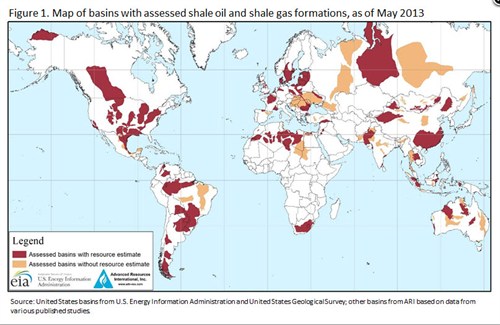Good or Bad: Shale Gas and Climate Change
Is shale gas good or bad for climate change?
Shale gas is on the rise around the globe. Countries around the world, including the UK, China, South Africa and Poland are struggling with the reality of whether the exploit the new resource and what it might mean for their energy systems. Somewhere on the agenda is a crucial question - what will it mean for greenhouse gas emissions?
Shale gas around the world
Since entrepreneurs in the USA worked out how to get gas out of shale rock using fracking of the rock, the world's leading energy institutes have been busy trying to work out what it means for global energy supplies.
According to the British Geological Survey, shale rock makes up 35 per cent of the world's surface rocks, so there's a lot of shale gas out there. Here's a map from the US's Energy Information Administration (EIA) showing shale rocks containing oil and gas around the world:

The USA is the great success story of shale so far. Over the last decade, shale gas production has boomed there, growing from less than one per cent of domestic natural gas production in 2000 to 23 per cent in 2010.
The International Energy Agency (IEA) says the USA's experience heralds "a sweeping transformation" that will redraw the energy map around the world as other countries follow suit.
China, for example, has nearly twice as much shale gas as the USA, although it hasn't developed it to the same degree yet. Other countries are also getting to grips with shale at varying rates - South Africa has recently lifted a ban on hydraulic fracturing for example, while France still has a ban in place.
Displacing coal, or displacing renewables?
What might this mean for global greenhouse gas emissions? While a significant new source of fossil fuel might sound like bad news for plans to reduce emissions around the world, it's not necessarily that simple.
Natural gas releases about half the carbon emissions of coal when it is burnt. Emissions from the United States fell to a 20-year low at the beginning of 2012. While energy efficiency and a shift to renewables also played a significant part in the fall, it was al least partially attributed it to a switch away from coal and towards cheaply produced shale gas.
In countries like Poland and China where there is heavy dependence on coal power, shale gas has the potential to reduce national emissions by displacing coal.
But it wouldn't necessarily play out in the same way in the UK. This country is already heavily dependent on gas, so there's less potential for a coal-to-gas switch to bring down emissions. Some commentators argue that shale gas could be used as a 'transition fuel' in the UK to tide us over to a decarbonised power system - but others say the government's enthusiasm for gas will drive away investors in the renewables industry, and therefore increase emissions.
The global context
But examining the question of what shale means for carbon emissions on a nation by nation level might be unhelpful, because it misses some of the complexity of the global power sector.
For example, increased consumption of cheap gas in the USA last year meant the Americans burnt less coal. As a result, they exported more, the price of coal went down in Europe, pushing coal consumption up - and increasing emissions in countries like the UK and Germany.
It's also hard to isolate what one particular technology might mean for emissions when there's so much else going on. The International Energy Agency has tried. In a special report published in 2011, it modelled the impacts of a 'golden age of gas' scenario, where production and consumption of gas is ramped up worldwide as a result of shale gas exploitation. The scenario made a lot of assumptions to get to the conclusion:
"This puts emissions on a long-term trajectory consistent with stabilising the concentration of greenhouse gases in the atmosphere at around 650 ppm, suggesting a long-term temperature rise of over 3.5°C."
The IEA says that "widespread application" of technologies such as carbon capture and storage (CCS) will be needed to reduce emissions from burning gas, if the world is to avoid a temperature rise of more than 2°C above pre-industrial levels. But CCS currently languishes in the political doldrums, and there are few signs that it will be in widespread commercial use in the near future.
Methane leaks - could emissions from shale gas be higher?
Environmentalists argue the picture is further complicated, because the IEA's analysis excludes the potential problem of 'fugitive emissions', where methane leaks into the atmosphere during the fracking process which extracts shale gas from the rock. Methane is approximately 25 times more powerful than carbon dioxide as a greenhouse gas over a 100 year timescale.
According to academics at Cornell university, fugitive emissions may mean shale gas releases more emissions than coal. But the question is hotly contested - many other academics disagree. And industrial bodies say that if best practice is used, the problem can be avoided.
Global context
As it gradually redraws the global energy map, shale gas may reduce greenhouse gas emissions on a country by country basis.
But it's the global context that matters from the point of view of what ends up in the atmosphere. Beyond the short term and on a global scale, it's hard to see how a significant new fossil fuel resource will be compatible with plans to radically reduce greenhouse gas emissions across the globe over the next couple of decades, without some serious regulatory clout and some technology breakthroughs.
By Robin Webster. Our thanks to Carbon Brief


